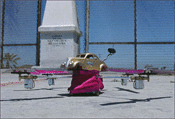Despite the fact that certain nations continue to insist on the building of walls to both quarantine and keep out certain economic and ideological actants, the politics of network culture find governments moving away from the old-school forms of control that involve physical, geographical, architectural wrangling and towards more high tech means of discipline. A conference at New York University, to be held next weekend, will examine this shift. Entitled Radars and Fences, the two-day event will bring together a handful of leading thinkers and activists to discuss the differences between "radars and fences, satellites and walls, networks and bunkers," the forces that have brought about these shifts, and what implications they hold for surveillance, public life, and creative practice. On March 6 and 7, speakers James DerDerian, Stephen Duncombe, David Lyon, and Trevor Paglen will sit on panels entitled "The Military between Transparency and Secrecy" and "Identification Protocols, Net Wars and the Struggle over the Securitization of the Internet." If these sound like a mouthful, it's only because there's a lot to say about the subject of the current state of surveillance and other machinery of control, and organizer Marco Deseriis (an academic, writer, and former Luther Blisset co-conspirator) ensures readers that "by looking at the grey areas where control and discipline, transparency and secrecy, democracy and the state of exception overlap and collide, Radars and Fences [will] provide a cross-disciplinary and experimental platform whereby researchers, artists, journalists, and activists can negotiate new and critical positions." - Marisa Olson
Image: Angel Nevarez and Alex Rivera, LowDrone, 2006
